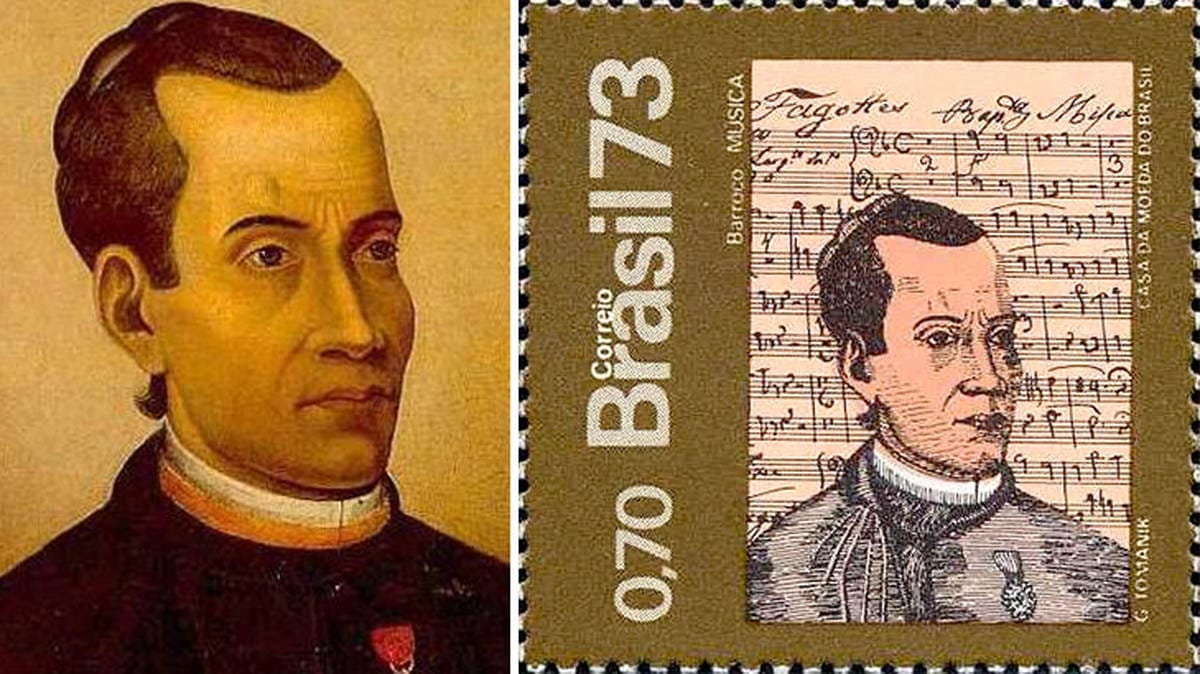The Untold Legacy of José Maurício Nunes Garcia

I usually listen to BBC Radio 3 while I work. Its primary focus is classical music and opera. So the sung music reflects the languages from that world: Italian, German, French, Latin, English, less frequently Spanish or even Russian; but Portuguese is a rare occurrence. So when I heard Portuguese sung in the ‘classical’ style in both senses of the word i.e. also music from the Classical period of music history, I was curious to know more.
The lifespan of José Maurício Nunes Garcia (1767-1830), “the father of Brazilian classical music”, nicknamed “the Brazilian Mozart” fits the Classical period (1750 – 1830) almost like a glove. He was the featured ‘Composer of the Week’ on the radio station, with hour-long segments in five instalments devoted to his extraordinary life and music. Garcia was being featured for the first time in Radio 3’s 80-year history of its ‘Composer of the Week’ programme.
He was born in Rio de Janeiro, the sone of black (both of them “bi-racial” or mulatto; fathered by their respective mothers’ white ‘master’) slaves who ‘earned’ their freedom. His father died when Garcia was young, but his mother spotted his affinity for music and at great sacrifice arranged for music lessons. The young boy had “a beautiful voice and a sharp musical memory”; “reproduced everything he heard”, and “created his own melodies and played the harpsichord and the guitar without ever have learned to”. At twelve he was giving piano lessons in society ladies’ homes and performing at local inns to supplement the family income. His first surviving composition was written when sixteen.
In 1792, Garcia was ordained a priest, (but only after undergoing some vague procedure to free him of his “colour defect”). It ushered in period of great productivity: 32 known pieces of music, among them graduals, antiphons, various psalms, a Magnificat for voices and organ, vespers and several works for Holy Week; and in 1797 his first Pontifical Mass of the See.
In 1798, Garcia was appointed chapel master, remarkable for someone of “colour.”
Despite his vow of celibacy, Garcia began a relationship with a woman Severiana Rosa de Castro (also “biracial like Garcia’s parents) with whom he had six children between 1807 (the first died young) and 1813. The relationship was extremely risky with legal and social stigma implications.
The move of the Portuguese Royal Court and nobility to Rio de Janeiro in 1808 following the French occupation of Portugal in the course of the Napoleonic war caused much upheaval in terms of population, resources and infrastructure.
Garcia conducted a massive orchestra and boys’ choir at the thanksgiving Mass for the safe arrival of the prince-regent and nobility. But many clergymen and musicians were envious of Garcia’s manifestly evident musical gifts and tried to poison the prince-regent’s mind about Garcia’s “visible physical defect.” Despite the intrigues, Garcia was appointed “master musician of the Royal Chapel”, thus making him “officially the first musician of the kingdom of Portugal.”
The prince-regent was so impressed with Garcia’s improvisation at the pianoforte at the palace in 1809 that he impulsively took a medal off a baron’s coat and conferred it on the musician, making Garcia a knight of the Order of Christ.
That same year he wrote two allegorical stage plays and was named archivist of the royal music files brought from Queluz Palace Lisbon to Rio. It widened his horizons to contemporaneous music and helped him incorporate new techniques in his compositions.
There are traces of Italian opera in his 1810 compositions; his Missa Pastoralis (1811) could have been inspired by Cherubini. His Requiem mass (Missa de Mortos) following the death of Queen Maria I and his own mother who died the same day (20 March 1816) is clearly influenced by Mozart’s Requiem.
One of Garcia’s piano études (Lição in Portuguese) begins exactly like the famous second movement Haydn’s ‘Surprise’ symphony (1791); another like Rossini’s ‘Barber of Seville’ overture.
In 1817, he became the first native Brazilian to compose an opera, ‘The Two Twins.’
Garcia composed around 70 works for royal occasions between 1808 and 1811.
But in 1811, a rival, Marcos António da Fonseca Portugal (1762-1830) showed up, summoned from Lisbon by the prince-regent for several possible reasons. Garcia was overburdened with work, and even required a leave of absence due to illness as a result. The price-regent was building a new theatre, and his children were coming of age to require music lessons, all of which meant help was needed.
The first meeting between the two composers in front of the Royal family is a much-storied and wildly mythologised event. Choreographed to belittle Garcia, Portugal placed one of Haydn’s most challenging piano sonatas before Garcia. The princess asked if Garcia “had even heard of Haydn”. Garcia indicated that he had, but was seeing this sonata score for the first time. With all the court watching, Garcia sight-read the work so well that even Portugal called it “an absolute triumph. Beautiful! You are my brother in art. Surely, you’ll be a friend to me.”
The musical duties were now divided between Garcia and Portugal; some interpret the allotment of royal ceremonial music to Portugal as a sidelining or a snub to Garcia. But it also meant Garcia now had time to supplement his income with commissions beyond the royal court. He had a large family to support, and even royal salaries were often delayed by months.
Although Garcia endure racial prejudice at every turn, Austrian pianist-composer Sigismund Neukomm (1778-1858) who was in Brazil from 1816 to 1821 admired him very much. Neukomm introduced Mozart’s Requiem to Brazil; Garcia conducted its first performance at the Igreja da Nossa Senhora do Parto (Church of Our Lady of Birth) on 19 December 1819, along with Neukomm’s ‘Libera Me’.
In 1821, the Royal family (with the price regent now João VI) returned to Lisbon. In recognition of 13 years of service to the court, the king gifted Garcia a lavishly decorated tobacco box. But the court took everything with them, leaving Brazil bankrupt. The new price-regent Pedro slashed benefits, severely affecting Garcia and others financially.
Brazil remembers him also because among his several students (who he taught gratis at his music school despite his reduced income in his final decade of life) was the composer of the national anthem (‘Hino Nacional Brasileiro’, 1831), Francisco Manuel da Silva (1795-1865).
At the funeral service following Garcia’s death in Rio in 1830, a small orchestra played his Funeral Symphony, composed 40 years earlier.
The piece that I heard on the radio, that sucked me into this vortex of discovery of this musical giant José Maurício Nunes Garcia was a ‘modinha’ (a secular form of Brazilian song which appeared in the 18th century and sung in serenades) that was only published posthumously: ‘Beijo a mão que me condena’ (I kiss the hand that condemns me). A line from its lyrics says “I love so much, without being loved.” It sounds almost autobiographical.
The calibre of Garcia’s mature works is truly top-drawer. Type his name into YouTube and you’ll listen to a composer in supreme command of his art despite all the life’s prejudices.
This article first appeared in The Navhind Times, Goa, India.





